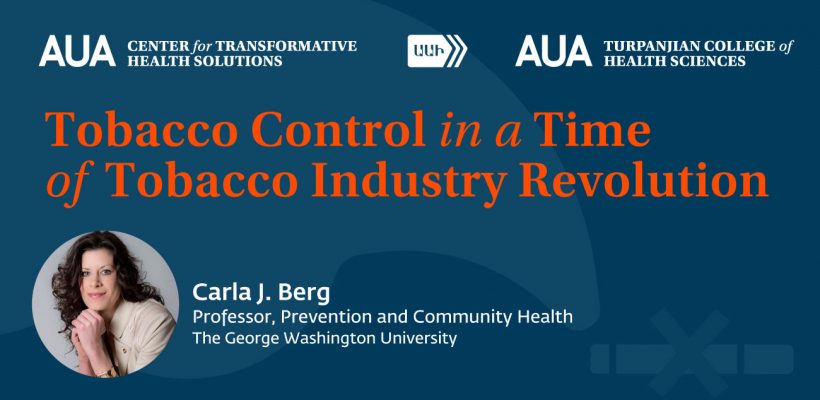
AUA Hosts Initiative Webinar on Tobacco Control
2 min readYEREVAN, Armenia — The American University of Armenia (AUA) Open Center for Transformative Health Solutions and Turpanjian College of Health Sciences (CHS), in collaboration with the National Institute of Health named after Academician Avdalbekyan, hosted an Initiative Webinar titled Tobacco Control in a Time of Tobacco Control Revolution.
The focus of the event was the nature of the rapidly evolving global tobacco policy and retail industry context, as well as implications for future research to advance evidence-based global research capacity.
The webinar featured Dr. Carla J. Berg, Ph.D., MBA, LP, professor and associate chair for Research in the Department of Prevention and Community Health at George Washington University’s Milken Institute School of Public Health, and associate center director for Population Sciences and Policy at George Washington University Cancer Center. Professor Berg has been selected as a Fullbright Scholar to collaborate with the Turpanjian College of Health Sciences. Her research focuses on multilevel determinants of health behavior. In particular, her research examines tobacco and marijuana use in the context of related policies and marketing influences; policy adoption,implementation, and evaluation; and the development and testing of scalable behavioral interventions to reduce chronic disease risk and burden.
Dr. Berg began her talk by presenting the theoretical framework and global factors influencing tobacco control efforts, and moved on to discuss several projects on tobacco control, regulation, and industry activity. Touching upon the tobacco industry revolution over the last decade, she emphasized its rapidly increasing pace and added that with every new tobacco control policy, several new products are introduced in the market to bypass the effects of those policies. Dr. Berg then presented several research articles based on studies she and her team have conducted investigating the exposure to marketing materials of novel tobacco products and their use, as well as the ways in which marketing shapes consumer perceptions and behavior. She also talked about the different ways the tobacco industry tries to influence consumers, including sophistication, and rebelliousness, trying to target different segments of the population.
Talking about how tobacco companies report on the harmful effects of their products, Dr. Berg emphasized that tobacco companies present data to regulatory bodies selectively. “They are not comprehensive; they do not report all of their results; they report only on selected harmful chemicals, because the levels are “good” for them, but omit others.” she highlighted.
Dr. Berg summed up her presentation with several recommendations based on the current evidence. Considering that the industry usually utilizes ‘loopholes’ in legislation, there is a need for more specificity in the wording of regulatory policy. Furthermore, she emphasized that regulations should have stronger implementation guidelines and enforcement plans. Without a quick regulatory reaction, the industry will continue to expand its non-compliance.
The Open Center for Transformative Health Solutions provides transdisciplinary education and collaborative experiences and stimulates collaborations outside the traditional public health disciplines to develop solutions to complex health problems modern societies face.
The AUA Turpanjian College of Health Sciences works actively to improve population health and health services in Armenia and the region through interdisciplinary education and development of health professionals to be leaders in public health, health services research, and evaluation, health care delivery, and management.
